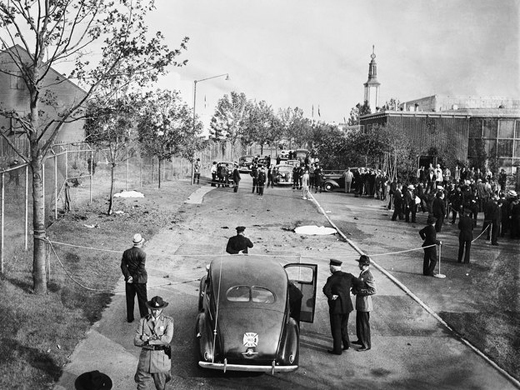Air Operations, Mediterranean
The Italians raid Malta and Alexandria.
[Battle of Britain
The Luftwaffe along with German MTBs attack Channel convoy OA178 south of Portland and the Stuka bombers sink 5 of the 9 ships involved. One of the ships sunk is the auxiliary AA ship Foyle Bank under Capt H. P. Wilson. 176 men are killed out of a complement of 298.
[Battle of the Atlantic
The British auxiliary anti-aircraft ship Foyle Bank is sunk in Portland harbor by German bombing. 176 of the crew are lost and 157 are rescued. Also sunk near Portland are the British steamer Elmcrest (4343t) with the loss of 16 of her crew, the British steamer Dallas City (4952t) with no crew losses, the Dutch steamer Deucalion (1796t), the Dutch steamer Britsum (5255t), the Estonian steamer Kolga (3526t) with the loss of 1 crewman, and the British tug Silverdial (55t).
[East Africa
The Italians advance from Abyssinia into the Sudan occupying Kassala and Gallabat just over the border. The Italians use more that 2 brigades at Kassala which is defended by only 2 companies of the Sudan Defense Force.
[North Africa
Towards evening the battle-cruiser Strasbourg, the aircraft carrier Commandant Teste and the 5 destroyers which succeeded in escaping from the British action at the port of Mers-el-Kebir, near Oran, reach port at Toulon. Winston Churchill speaks to the House of Commons on Oran: "I leave the judgment of our actions with confidence to Parliament. I leave it to the nation and I leave it to the United States. I leave it to the world and history."
[Rumania
King Carol appoints a pro-Axis Cabinet. The prime minister is Ion Gigurtu and the Foreign Minister Mihai Manoilescu who represents the Iron Guard. The policies of the new government are clearly pro-German and anti-Semitic.
[United States, Home Front
The British Pavilion at the New York World's Fair |
 |
In the wake of that terrible explosion on July 4, 1940, safer methods for removing and dismantling bombs were developed, saving untold lives in the process. Yet New York remains a target for terrorists looking to make a statement about global politics. The message changes, the enemies speak different languages, but for those who pack explosives into crowded tourist attractions, the modus operandi is always the same. "These things invariably … come back to New York," said Mayor Michael Bloomberg in the wake of the Times Square attempt.
[Vichy France
The Pétain government of France breaks off diplomatic relations with Britain because of the Royal Navy's attacks on the French fleet. Pétain, Laval and Darlan urge a delclaration of war against Britain and discuss military action which might be initiated, including an attack, with the Italians, against Alexandria to free the French ships there. War is not declared, primarily because of the arguments of Foreign Minister Paul Baudouin that war with Britain will worsen France's already pitiful condition. Laval is most insistent on a declaration of war, as he later states, "France has never had, and will never have, a more relentless enemy that Great Britain. All our history attests to it."
[